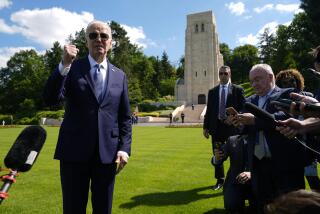Alzheimer’s Disease
- Share via
Alzheimer’s disease took my father-in-law from our family almost two years ago. Rep. Edward R. Roybal (Op-Ed Page, Dec. 25) called the illness “vicious.” I hasten to agree; it devastates patients and their families. Our Dad was among the “lucky” ones! From that shocking moment when the diagnosis of Alzheimer’s disease became a reality rather than a guess, his suffering was short-lived. For that, he was fortunate; we who loved him deeply were spared.
Effortlessly, happily, we continue to remember and cherish Dad, a special gentleman, a devoted father. And, effortlessly, we forget the Alzheimer’s--pain recedes so quickly in memory. But we must not allow that to happen. For the sake of our family and all the other Alzheimer families who comprise the rapidly escalating statistics that Roybal discusses, we must remember. For our loved ones who suddenly forget how to tie their shoes, who look accusingly into the mirror and mutter, “ . . . Who is that?” who grab a beloved child’s fingers in a vice-like grip, “Why are you doing this to me . . . ?” who scream “police” from a balcony for no rational reason--we must remember!
Some say the mind is destroyed by Alzheimer’s; I never believed it. Periodically, when we said “Goodby, Dad, we’re returning to California, see you next visit,” he would answer, “OK, sweetie” and, to his nurse, “Don’t you go!” And they said his mind had gone!
The uncertainty of that concept alone is reason enough to rush to support the search for cure. So too are the pain and trauma, the exhaustion and frustration of care givers. The cost of care, in or out of institutions, is fiercely destructive of families--another compelling reason.
But none of them can match--in my mind--the awful confusion of the patient who, sitting, helplessly in a chair, watches the world spin by without being able to say, “Stop--let me tell you where it hurts!”
Roybal accuses us of not understanding “the magnitude of Alzheimer’s disease and its effect on millions of American families.” Those who have not borne witness to the disease cannot understand; certainly not fully. But we who have experienced it do understand and we must share our understanding with others in order to persuade them to join in the call for research that will, eventually, eradicate this devastation to which we are all vulnerable.
AGNES G. HERMAN
Lake San Marcos
More to Read
Sign up for Essential California
The most important California stories and recommendations in your inbox every morning.
You may occasionally receive promotional content from the Los Angeles Times.













